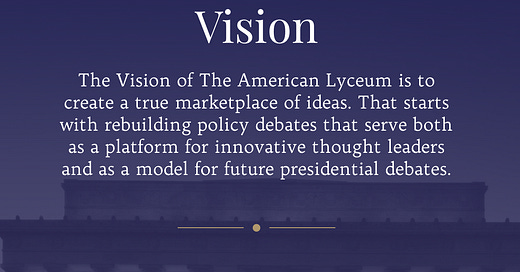Policy for Inflation Control: Conte, Kane, & Litan's American Lyceum Project
Garrett Jones, John Taylor, & Brad DeLong, moderated by Tim Kane; 2023-06-08 Th
Tim Kane, Bob Litan, & J-P Conte’s American Lyceum Project <https://theamericanlyceum.org/> hopes to “rebuild… civil society through innovative research and hosting solution-focused debates”. We all wish them and it great luck. The catchphrases are “civil discourse”, “solution-centric discussion”, and “alternatives to conventional political debate formats”. They have five debates up so far: <https://theamericanlyceum.org/debates/>.
My part of this so far is a 27-minute discussion with John Taylor and Garrett Jones about “what can the US government do to control inflation?”:
The nine solution-centered ideas put forward were
“more inflation hawks on the FOMC”,
“keep the Fed’s mission very narrow”,
“credibly reduce the long-run budget deficit”,
“recognize the Fed kept interest rates too low for too long”,
“recognize inflation has become global”,
“rules-based monetary policy with a 2% inflation target”,
“Fed should keep successfully managing inflation expectations”,
“recognize that the plague recession required lower-for-longer interest rates”, and
“Congressional leaders should have Powell’s and Yellen’s back”.
Guess which three were the ones I put forward!
I made a… not-a-transcript. I took the automatic Google YouTube transcript—which is just a string of words, fed it to Chat-GPT4 asking it to punctuate and identify speakers, and then corrected a couple of speaker misidentifications. But I just skimmed what came out—I have no idea how many hallucinations are in this:
Thinking back over the debate, I find myself once again simply not understanding large parts of John Taylor's thought.
He think the Federal Reserve has greatly undermined its credibility by moving late and fast to deal with the inflation problem. But I see no evidence for that credibility loss anywhere at all.
He thinks that the optimal policy rule does not depend on whether interest rates are near the zero lower, bound or not. But very elementary options theory tells you that preserving flexibility is often a very valuable thing, and to tighten monetary policy in a way that turns out ex post to be premature throws that flexibility and valuable optionality away.
He thinks that the Phillips Curve is much, much steeper in response to labor-market tightness than any set of empirical estimates of which I am aware has ever indicated.
One good issue John Taylor raised was this: How much damage was done to financial stability by the Fed’s moving late and fast in this business cycle? Several large albeit not behemoth banks are gone. There are substantial open and hidden losses elsewhere among our highly leveraged banks from interest-rate and commercial real-estate bets gone wrong. How big a minus is that for the policy the Fed adopted? My suspicion is that it is only a small minus. But I do not really know.






As a general point, I'd like to see the word "discussion" used when serious people try to hash out a solution to a problem. The word "debate" has acquired too many negative connotations.
I think fiscal policy should take into account the 1.5 multiplier. Fiscal conservatives won the argument in 2010 and restricted Fed's available instruments and ability to act. Looking back I think their fiscal policy was incorrect.